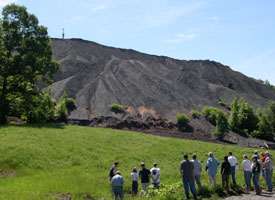Congressional Sleight of Hand Makes Abandoned Coal Mine Clean-Up Funds Disappear

courtesy of the Western Pennsylvania Coalition for Abandoned Mine Reclamation
The Nemacolin Gob Pile, a giant mountain of coal waste, looms over a field in Greene County, Pa..
Pennsylvania just lost $178 million in federal dollars earmarked for cleaning up abandoned coal mines. It involved a Democratic Senator from Montana, transportation funding, had something to do with Wyoming, and everyone is scratching their heads. Here’s what we know.
Pennsylvania’s environmental problems began with coal mining more than 150 years ago, and communities in northeastern and southwestern parts of the state still live with that legacy. Federal funds to help clean up the coal industry’s damage started flowing to the states in the 1970s under the Surface Mining Control and Reclamation Act of 1977. The idea was simple: make the current coal industry pay for the mistakes of past coal companies.
States like Pennsylvania had lots of abandoned coal mines. In the 1950s and 1960s, coal companies walked away, leaving behind a mess. Some abandoned mines would catch on fire, or fill up with water that would overflow, and end up contaminating streams and rivers. Also left behind were mountains of coal waste, which when exposed to air or water, turned into acid, further polluting groundwater. Subsidence is also a big problem. That’s when the gaping holes left by the coal miners collapse, leaving large sink holes in basements, or gobbling up whole houses.
But with money from a coal industry tax, those orange creeks began to clear up, and fish started to swim again. The coal industry was on board, the environmentalists liked it, and states had a reliable pot of money to work with. So how did it end up getting cut without anyone knowing about it?
Andy McAllister helps run the Western Pennsylvania Coalition for Abandoned Mine Reclamation. The day after President Obama signed into law a bill that ended up stripping Pennsylvania and other states of this funding, McAllister saw an article pop up in his Google alert.
“My jaw dropped,” says McAllister.
It turns out that in order to balance the budget on next year’s transportation bill, Congress dipped its hands into the pot of money meant to help clean up abandoned mine damage. Senator Max Baucus, a Democrat from Montana, is the one accused of engineering what some are calling a raid. Apparently, Baucus didn’t like the fact that Wyoming was still getting some of this money, even though its mines were already cleaned up. Once a state has successfully reclaimed lands damaged by its mines, that state is considered “certified.” So Wyoming officials were taking the money despite its certification, and spending it on other things, like building more roads.
Greenwire reporter Manuel Quinones wrote about this on July 6.
Several sources have pointed at members of the House Ways and Means Committee or the Senate Finance Committee as likely culprits — particularly Finance Chairman Max Baucus (D-Mont.), who is familiar with AML issues and sat on the transportation conference committee. Montana is a certified state like Wyoming, but the payout threshold for mining reclamation spared it from direct cuts.
A Baucus spokeswoman said the senator is on record supporting the AML fund compromise. In fact, he has helped thwart other efforts to eliminate all payments to certified states and tribes, including his own.
“While Senator Baucus did not raise this provision in the conference,” the senator’s office said in a statement, “he did not oppose it, because it cracks down on wasteful spending while protecting states like Montana who are using their AML money for mine cleanup.”
But Pennsylvania is far from certified. And the complex nature of the law means that not only Wyoming’s funding gets cut, but lots of other uncertified states like Pennsylvania and West Virginia see their funding get cut as well.
In the meantime, Pennsylvania has an estimated $1 billion clean-up on its hands. “All of southwestern Pennsylvania is held up by 100-year-old wooden posts,” says McAllister.
McAllister says the state has 200,000 to 250,000 acres of abandoned mine land, and 4,000 to 5,000 miles of polluted streams to clean up. He says he’s meeting with Senator Casey’s staff next week and hopes to encourage the Pennsylvania delegation to get the funding back. But so far, he hasn’t heard much.
















